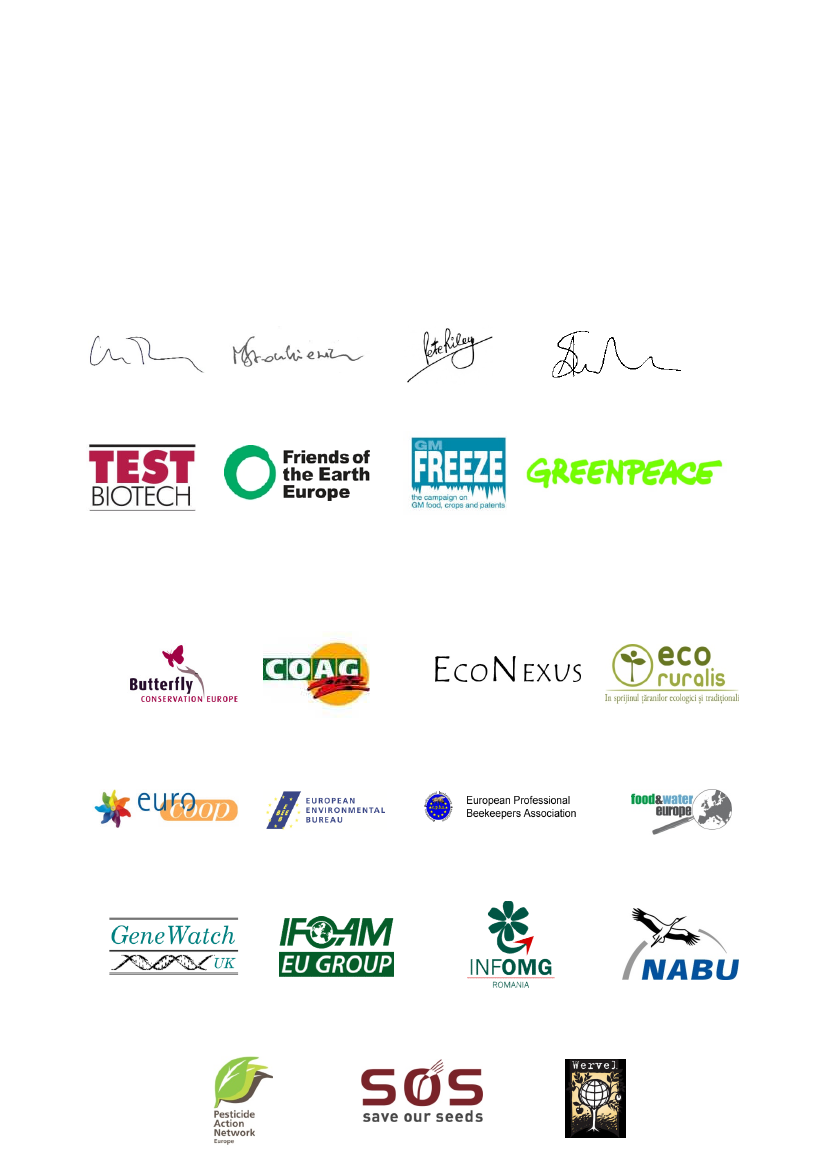Miljø- og Planlægningsudvalget 2010-11 (1. samling), Udvalget for Fødevarer, Landbrug og Fiskeri 2010-11 (1. samling)
MPU Alm.del Bilag 587, FLF Alm.del Bilag 282
Offentligt
Mrs. Karen EllemannMinistry of Environment and EnergyHøjbro Plads 41200 CopenhagenDenmark13 April 2011Re: EFSA guidance for the environmental risk assessment of genetically modified plants
Dear Mrs. Karen Ellemann,We are writing to you to express our concerns on the guidance by the European Food SafetyAuthority (EFSA) for the environmental risk assessment of genetically modified (GM) plants1. This was published in November 2010, is currently discussed at Standing Committee level andawaits adoption by EU countries.Whilst it is positive that for the first time this environmental risk assessment guidance will be legallybinding, the methodology put forward by EFSA is not sufficiently rigorous. Once again, there is a riskthat the EU Directive on the Deliberate Release of GMOs (2001/18/EC) will not be properlyimplemented, and that the Environment Council’s 2008 Conclusions on the need to improve the riskassessment will continue to be ignored.2Choosing the right methodology for the risk assessment of genetically modified organisms (GMOs) isscientifically controversial. As a supposedly neutral EU agency, EFSA should have acknowledged this.However, in certain crucial parts of its new guidance, EFSA simply takes up the methodology favouredby scientists who work closely with the agro-biotech industry.3If the draft guidance were adopted byMinisters as it stands, companies wishing to commercialise their GM plants in the EU could determineessential elements of risk assessment, allowing them quick and easy product approval.The annex of this letter contains a detailed analysis for consideration by your experts. We have listedthe most problematic parts in the new guidance, and the methodological improvements that webelieve are necessary. European scientists4and NGOs5have already submitted their critiques onprevious versions of the guidance to EFSA. While some of them have been included, crucialcomments on essential parts of the guidance have not been taken into consideration.We ask you to substantially improve the guidance. Otherwise, it will be “business as usual” with EFSAcontinuing to rubber-stamp industry data without ensuring thorough testing, and it will be impossiblefor Member States to justify GMO environmental risk assessments to their citizens. Once the text ofthe guidance is strengthened, it is of utmost importance that you ensure that it is rigorouslyimplemented: EFSA has to improve its assessments in practice, when formulating its opinions on thesafety of GM crops.Finally, as you know, the approval of GMOs does not only require strict environmental riskassessment, but also risk management, as well as the correct implementation of all aspects of EUlaw. As risk managers, the European Commission and EU governments must act on scientific
1
European Food Safety Authority (EFSA), Scientific opinion. Guidance on the environmental risk assessment of geneticallymodified plants. EFSA Panel on Genetically Modified Plants, EFSA Panel on Genetically Modified Organisms (GMO), EFSAJournal 2010; 8(11):1879.2Council Conclusions on Genetically Modified Organisms (GMOs) 2912th Environment Council meeting, Brussels, 4 December2008.3See the parts of the EFSA guidance introducing problem formulation (EFSA Guidance, section 2.2.1.) and comparativeassessment (EFSA Guidance, Figure 1, p.11 and Chapter 2.1, p.12-13). For more details, also see annex to this letter.4Submission of the European Network of Scientists for Social and Environmental Responsibility, April 2010.5E.g. Submission of Greenpeace, April 2010; see also: Testbiotech analysis of EFSA Guidance on the environmental riskassessment of genetically modified plants, December 2010.
uncertainty and apply the precautionary principle. Furthermore, an assessment of the socio-economicimpacts of GM crops must be firmly included in the authorization process, alongside environmentalrisk assessment.We urge you to bring these important matters to the attention of the European Commission and toensure that EFSA’s risk assessment for genetically modified plants is scientifically rigorous. Nogenetically modified plant should be authorised as long as its risk assessment does not comply withthe strict requirements of EU law. This is in the interest of European consumers and the environment.Yours sincerely,
Christoph Then,Executive director,Test Biotech
Magda Stoczkiewicz,Director, Friends ofthe Earth Europe
Pete Riley, CampaignDirector GM Freeze,UK
Mahi Sideridou,Greenpeace EuropeanUnit Managing Director
Josef Settele, Chairmanof ButterflyConservation Europe
Miguel LópezSecretary GeneralCOAG
Ricarda Steinbrecher,Co-Director EcoNexus
Doug Knight, ProjectManager, Eco RuralisAssociation
Rodrigo Gouveia, SecretaryGeneral of EuroCoop
Pieter de Pous, EU PolicyDirector EuropeanEnvironmental Bureau
Walter Haefeker,President, EuropeanProfessional Beekeepers
Gabriella Zanzanaini,Director of European Affairsfor Food & Water Europe
Helen Wallace,Director GeneWatch UK
Marco Schlueter,Director of IFOAM EUGroup
Ramona Duminicioiu,Director, InfOMG Romania
Leif Mueller, ExecutiveDirector, Nabu
Hans Muilerman,Coordinator, PesticideAction Network
Benedikt Haerlin,Coordinator,SaveourSeeds
Luc Vankrunkelsven,responsible for networkingand lobby work, Wervel


